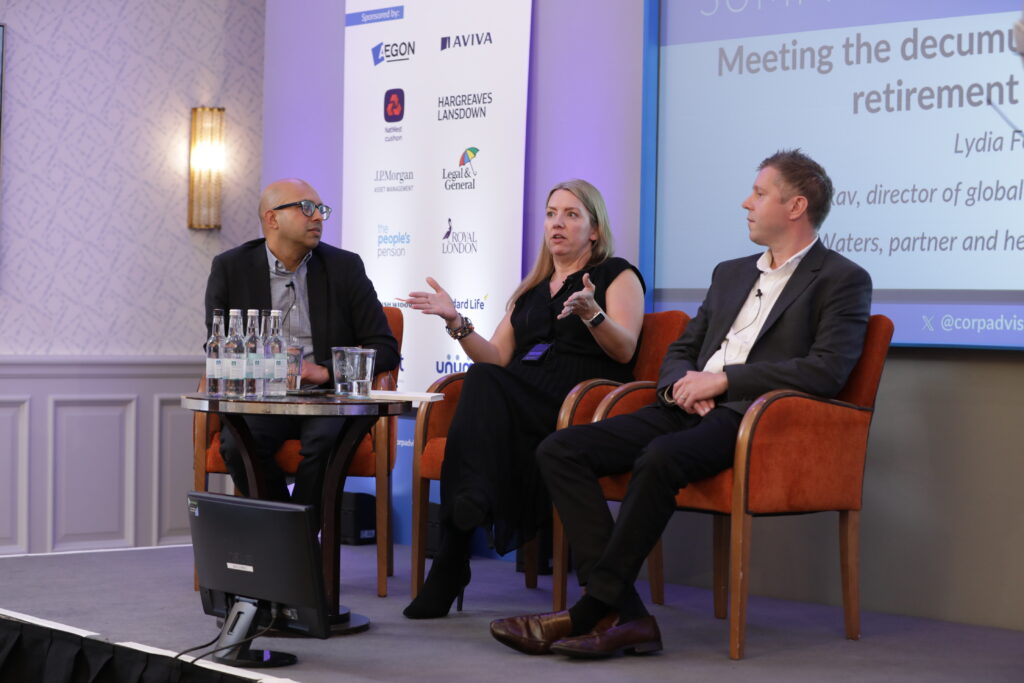Leading consultants remain sceptical about whether decumulation-only CDC or transferring DC pots into defined benefit arrangements will be effective solutions to the current decumulation challenge.
At a panel event at the Corporate Adviser Summit, three leading consultancy firms discussed the issues facing both the industry and pension savers when it comes to transferring DC pots into a sustainable retirement income.
Most did not expect the Royal Mail’s CDC plan, due to be launched next week, to be widely replicated across the industry. LCP partner Lydia Fearn said the design of this scheme was very specific to the needs of the Royal Mail as a company. “As it stands, this is not going to be a mass market option,” she said.
Capita’s director of global pensions policy and propositions, Anish Rav, said the majority of employers are still going to be using DC arrangements going forward. “CDC is only going to be used in very particular circumstances,” he said.
However, Hymans Robertson’s Paul Waters added that there were a few companies exploring whole-of-life CDC options, although in many cases, these were for very specific company reasons. He said he didn’t expect a sudden rush to adopt these schemes, describing the launch of the Royal Mail scheme as “like firing a starting gun on a snail race.”
Waters added that while the market needed innovation in the decumulation space, there were certain challenges with decumulation-only CDC, particularly around pooling investment risk on a short-term basis while also requiring liquidity. “The other challenge is that if you launch a decumulation CDC and no-one joins, it will affect the sustainability of the scheme.”
For many people, though, he said there would be advantages to pooling longevity risk. However, he added that pension savers need to focus on what is important to them: securing an uplift to their retirement income today or retaining the flexibility to pass on assets after death.
The panel was also asked about a potential new solution: the option to shift DC assets into a DB environment, potentially delivering a higher income than an annuity, but with the guarantee being underwritten by the Pension Protection Fund if the DB scheme is unable to meet its liabilities. Edi Truell, founder of private equity group Disruptive Capital, is proposing launching such a scheme via his new PensionHaven venture
The panel agreed that innovation was important — and options like this were worth exploring further. Waters said that if such schemes received appropriate approval from regulators, he would be happy with such arrangements, although he pointed out that this had not happened yet.
Fearn said: “It is great that there are other models being developed that will potentially challenge the market. However, I think there is still the potential issue of scale with something like this.” Many would want to see it tried and tested before trusting retirement savings to such arrangements she added.
Rav added that, again, a solution like this would need scale, which may be a challenge. He noted that, as with current decumulation options, from drawdown to annuity, there are communication challenges around how the inherent risks are explained for what is likely to be a complex product.
The panel said there had been insufficient innovation in the decumulation space from occupational pension schemes, which will shortly be required to offer retirement income solutions to members.
Waters described the degree to which occupational schemes had embraced change in this area as “disappointing,” whether this involved offering their own solution or signposting members to help with retirement decisions.
He said he anticipated that, in the future, many own-trust schemes would partner with master trusts to offer retirement solutions, with larger schemes potentially launching their own bespoke solutions.
Fearn added that many schemes would look to offer ‘bolt-on’ retirement solutions, often by partnering with a master trust. Part of their role as consultants was to work with schemes to ensure there was a smooth journey from own-trust to master trust arrangements in retirement.
Rav agreed that it was important to remove frictions. “The challenge is to think of accumulation and decumulation as one big journey, although it might involve different phases. It’s important to remove the frictions between these different elements.”
He said this would entail looking at the investment strategy — for example, not reducing equity exposure only to have to increase it again when moving towards a drawdown solution, as this would incur unnecessary costs from moving in and out of equity holdings. Rav said this also encompassed technology and communications, particularly in terms of the terminology used.
“We have to consider what the whole picture looks like for members, and for schemes and trustees. A holistic view is needed,” he added.
The panellists agreed there was a need for a variety of decumulation solutions to meet a range of member needs, with a ‘default’ solution likely to be less universal than for members at the accumulation stage. Fearn said she was hopeful of seeing a decumulation solution launched towards the end of this year. “I would certainly expect to see something by the start of next year at the latest.”
Fearn added that LCP had championed a “flex now, fix later” approach as a “soft default” option, opting for a drawdown approach in the early years of retirement before moving towards guaranteed income at a later stage. The consultants also agreed that ensuring people had adequate advice or guidance around this would remain challenging.
Rav concluded: “For those in drawdown, there is certainly a need for guardrails and sufficient warnings around taking too much money from your plan.”
